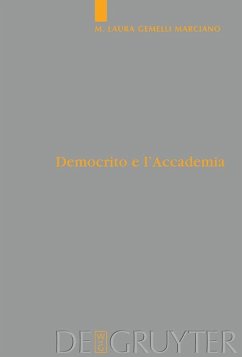How did the Ancient Greek Atomists come to assume the existence of atoms, and how did they understand their indivisibility? These are the most difficult questions facing researchers into Atomism in Classical Antiquity, and it is these questions that Laura Gemelli addresses in the present study. She re-examines the Ancients' tradition from a new perspective, starting from the influence that academic atomism and the attendant problems and concepts had on Aristotle's interpretation of ancient Atomism.
This hitherto neglected perspective leads to a critical revision of generally accepted theses such as the origins of Atomism in Eleatism and the postulation of the atom as a solution to the aporias of infinite divisibility. The author then follows the further development of the views of Atomism put forward by Aristotle and Theophrastus as far as the Neo-Platonists. This book provides the foundations for a re-evaluation of the sources and a shift in perspective for research into the Ancient Atomists.
Wie sind die antiken Atomisten zur Annahme der Atome gekommen, und wie haben sie deren Unteilbarkeit aufgefasst? Dies sind die schwierigsten Fragen in der Forschung zum antiken Atomismus, und ihnen widmet sich Laura Gemelli in der vorliegenden Studie. Sie überprüft die antike Überlieferung unter einem neuen Gesichtspunkt: nämlich ausgehend von dem Einfluss, den der akademische Atomismus und die damit verbundenen Problemstellungen und Begriffe auf die Interpretation des antiken Atomismus bei Aristoteles hatten.
Diese bisher vernachlässigte Perspektive führt zur kritischen Revision allgemein akzeptierter Thesen wie der Entstehung des Atomismus aus dem Eleatismus und der Annahme des Atoms als Lösung der Aporien über die unendliche Teilbarkeit. Die von Aristoteles und von Theophrast ausgehenden Auffassungen des Atomismus werden dann in ihrer weiteren Entwicklung bis zum Neuplatonismus verfolgt. Das Buch schafft die Grundlagen für eine Neubewertung der Quellen und für eineVerschiebung der Perspektive in der Forschung zum antiken Atomismus.
This hitherto neglected perspective leads to a critical revision of generally accepted theses such as the origins of Atomism in Eleatism and the postulation of the atom as a solution to the aporias of infinite divisibility. The author then follows the further development of the views of Atomism put forward by Aristotle and Theophrastus as far as the Neo-Platonists. This book provides the foundations for a re-evaluation of the sources and a shift in perspective for research into the Ancient Atomists.
Wie sind die antiken Atomisten zur Annahme der Atome gekommen, und wie haben sie deren Unteilbarkeit aufgefasst? Dies sind die schwierigsten Fragen in der Forschung zum antiken Atomismus, und ihnen widmet sich Laura Gemelli in der vorliegenden Studie. Sie überprüft die antike Überlieferung unter einem neuen Gesichtspunkt: nämlich ausgehend von dem Einfluss, den der akademische Atomismus und die damit verbundenen Problemstellungen und Begriffe auf die Interpretation des antiken Atomismus bei Aristoteles hatten.
Diese bisher vernachlässigte Perspektive führt zur kritischen Revision allgemein akzeptierter Thesen wie der Entstehung des Atomismus aus dem Eleatismus und der Annahme des Atoms als Lösung der Aporien über die unendliche Teilbarkeit. Die von Aristoteles und von Theophrast ausgehenden Auffassungen des Atomismus werden dann in ihrer weiteren Entwicklung bis zum Neuplatonismus verfolgt. Das Buch schafft die Grundlagen für eine Neubewertung der Quellen und für eineVerschiebung der Perspektive in der Forschung zum antiken Atomismus.

